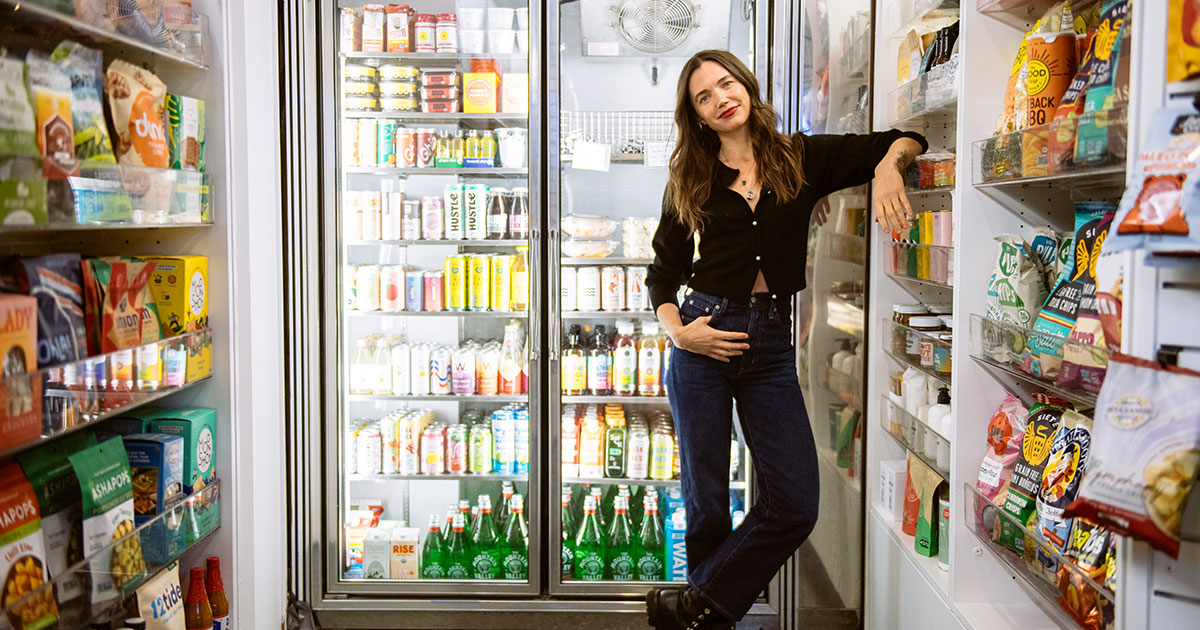A Better Kind of Convenience Store
The Origin Story of The Goods Mart

Last Updated: By TRUiC Team
Almost everyone loves convenience stores. The problem is that most of the stuff they sell is bad for you: sugary, processed junk that’s contributing to chronic health conditions like obesity and heart disease.
Rachel Krupa, founder and CEO of The Goods Mart, set out to change that narrative. The Goods Mart’s mission is to introduce local communities to better-for-you, better-for-the-planet convenience foods. This is its story.
For the Love of Sunoco
Rachel’s inspiration for The Goods Mart stemmed from her fond childhood memories of hanging out with friends at a gas station.
“I love Sunoco gas station,” she says. “[That] was my happy place. It was a place that we got milk, eggs, cheese. I got my rocket popsicle or my Good and Plenties. But it was [also] a place that you also saw friends that you went to highschool with. You saw friends, neighbors, and aunts and uncles. It was a really incredible hub of the community…. For me, that gas station was this place that always brought me happiness.”
However, she came to realize that although she and others may have been happy at the Sunoco, their bodies weren’t thrilled with what they were buying there.
“As I became more educated in regards to quality of ingredients, I realized that all the things in the store were not necessarily convenient for me anymore,” she says. In other words, as she got older and learned the adverse impact of most convenience foods on human health and the environment, her priorities changed. “I don't want the same old products. I want the better-for-you products that exist and [are] expanding rapidly today.”
Better for People and the Planet
Today, The Goods Mart operates three stores in New York City, all of which aim to serve anyone in the community looking for better-for-you, better-for-the-planet options from emerging brands in the food space.
Products are non-GMO and don’t have artificial flavors and other junk that fills typical convenience foods. Instead, products contain healthier, more sustainable ingredients like banana flour, chocho flour, regenerative grains, and upcycled or heirloom materials.
The company is also focused on the founders of the brands it sells. “We really love to look at the founders who are making the products that fill our stores,” she says. “A majority of the brands in our stores are female-founded or from diverse founders.”
Advice for Founders
Rachel has a simple piece of advice for founders and aspiring entrepreneurs: “Rip the band-aid off and do it.”
“I think you always… think there's a perfect time to do something [and] I have to have my X, Y, & Z in row in order for me to do this,” she says. “Guess what: [If] you have X, Y, & Z lined up and you do it, Y or Z is gonna go askew, so your plan is gonna get fucked up no matter what. So if you just rip the band-aid off and do it, you're jumping in feet first and you're going to be able to swim. You're going to have a better understanding of what is changing and what is going [on] in order for you to do it. Yes, have a backbone of what you want to do, but there's no perfect time to do anything. Just do it.”
Expansion Plans
So what’s next for The Goods Market. For one thing, Rachel wants to expand the number of convenience stores the company operates (Soho, 11 West 42nd Street, and Rockefeller Center). The latter two involved taking over a newsstand and moving into an office building. “Those are five-day-a-week businesses because we're servicing the tenants above us because it's where the NBC, Deloitte, Luzardo's, Michael Kors, and Valentino Burberry corporate offices are,” she says.
As the company looks to expand beyond that solid customer base, her preference would be to acquire small stores. “Right now, our biggest store is 500 square feet, if that,” she says. “So we have a lot packed [in] because I love small spaces [that allow] you to have better interactions with your customers.”
The Goods Mart is also starting other verticals, including curating mini bars for hospitality groups and setting up corporate pantries. “For us, it's really [about] helping emerging brands grow and expand their reach… beyond our stores [and] into the hands of others where they're snacking in their office, in a mini bar, a coffee shop,” she says. “So we're expanding our verticals in that way.”
Rachel’s ultimate goal isn’t to have as many stores as possible but to make a difference in individual customers’ lives. “[My] drive is not having X amount of stores [in] X amount of years, because real estate is expensive and… logistically, it's much harder,” she says. “For me, it's the impact I want the stores to have, not the number of stores I want to have. From the PR agency, it's the quality of the clients and the thoughtfulness and the impact that we have on the team that is able to get the clients that we have, because the team is incredible. That's very successful for me. So I think success in the past couple years has been to… actually have an impact more than what classically success is for most people.”





